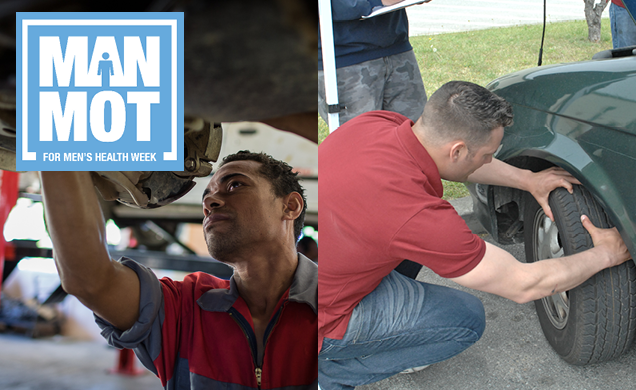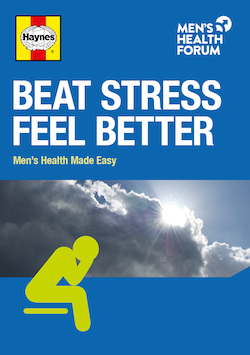DIY Man MOT

Your car gets one regularly but what about you? No, not a parking ticket, an MOT.
Giving your body a once-over doesn’t require any spanners and needn’t cost a penny. If you’re worried about the results of any of the following tests, see your GP.
Test 1: Is your engine tuned?
First, check your pulse. Place the finger of one hand on the thumb side of the tendons running through the opposite wrist. You should be able to feel the radial artery pumping. Count the beats over four 15 second periods and add them up. This is your resting pulse – a good guide to the heart’s efficiency. Joggers and other fitness enthusiasts will get very excited about resting pulse and try to get it as low as possible.
Then, check your recovery rate. Step on and off a step for three minutes (average a step every three seconds) and rest for 30 seconds before taking your pulse again. This is your pulse after exercise.
The table below shows you what sort of results you should be getting for your age:
| Very Fit | ||
| Age | Resting | After exercise |
| Teens/20s | 59 or less | 75 or less |
| 30s | 63 or less | 79 or less |
| 40s | 65 or less | 81 or less |
| 50s+ | 67 or less | 83 or less |
| Average | ||
| Age | Resting | After exercise |
| Teens/20s | 60-85 | 76-101 |
| 30s | 64-85 | 80-103 |
| 40s | 66-89 | 82-105 |
| 50s+ | 68-89 | 84-107 |
| Unfit | ||
| Age | Resting | After exercise |
| Teens/20s | 86+ | 102+ |
| 30s | 86+ | 104+ |
| 40s | 90+ | 106+ |
| 50s+ | 90+ | 108+ |
If you’re in or close to the unfit range, you need to think about whether you’re taking enough exercise. Read our Get Fit section. (If you’re older, very overweight or have an existing health problem, check with your GP before starting an exercise programme.)
- The NHS also offers a more detailed What's Your Heart Age? tool.
Test 2: Are you overloaded?
The simplest guide to whether you’re carrying too much weight is your waist measurement. This gives you a fair idea of your risk regardless of height. Measure around your belly at the widest point - usually around your belly button:
- over 37 inches, you’re probably overweight and at increased risk of heart disease, diabetes and cancer - check out our Get Fit section
- over 40 inches, you could be obese and at serious risk of the conditions mentioned - talk to a GP or health professional
If you’re putting on weight, see our Get Fit section. But if you have been losing weight for no apparent reason, it may be a sign of something serious, see your GP.
Test 3: Look out for dashboard 'warning lights'
Check yourself all over for:
- moles changing shape (more detail here),
- unexplained lumps,
- unexplained shortness of breath/breathing difficulties
- unexplained pain (especially in the chest)
- swelling or itching,
- a cough that won’t go away,
- blood where it shouldn’t be (in saliva when you spit or stools when you crap)
- changes in bowel habits (such as blood in stools, diarrhoea or constipation for no reason, a feeling of bloating or of not having fully emptied your bowels or pain in your stomach or back passage - more detail here)
If you have any of these talk to your GP.
Test 4: Wobbly gear stick?
Erection problems are common. We can't always get an erection when we want one. What we’re talking about here are regular problems getting an erection or keeping one.
It’s not only your sex life that may be threatened. Erection problems can be an early warning sign of a number of serious health problems including heart disease, diabetes, high blood pressure and depression. They could also be sign of high cholesterol or low testosterone. Again, talk to your GP. (For a full penis health MOT download our free manual Size Isn't Everything.)
Test 5: Check the water
Is there any change in how often you pee or how easy it is? Do you get up more often at night?
Peeing more often, especially at night, and less easily with a weaker flow can be signs of prostate enlargement (more detail on prostate symptoms here). Prostate enlargement is not necessarily a sign of cancer but it needs to be checked (Prostate Cancer UK have a simple cancer risk checker tool.)
Peeing more often, especially at night, along with being overweight, tiredness and sores healing more slowly may all be signs of diabetes. Get your blood sugar tested.
Test 6: Day-to-day performance
How are you feeling? Are you motoring along smoothly? Try our How Are You Really quiz. And check out our How Are You hub.
However you're feeling, try the CAN DO challenge which you can read all about in our CAN DO manual - soon to be available as a free download
Test 7: Check your pressure
You can take your blood pressure at the GP - there’s probably a machine in the surgery waiting room - or you can buy a home-tester.
BP - as they say in the hospital dramas - is given as two figures. The first is when the heart is contracting (systolic), the second when it is resting (diastolic). 120/70 would be fine for a young man. Once the systolic starts getting up towards 140 and/or the diastolic to 90, you need to monitor your BP more often. Of course, any stress can raise your BP temporarily but if you’re getting regular readings of 140/90 or more, see your GP.
Anything else
You might want to monitor your balls for any changes. Testicular cancer is the most common cancer in men aged 20-35 but if caught in time it can be effectively treated and deaths are rare. (More details here.)
Take advantage of free check-upsYou have an MOT to spot possible problems with your car before they occur. Health screening is based on the same idea. Screening is about looking proactively for any developing issues to deal with them before they impact on health. Most men aged 40-74 in England should be regularly invited for an NHS health check. It can help you spot upcoming heart disease, diabetes, kidney disease, stroke and other health problems. If you haven’t been invited or haven't had one for five years or more, ask your GP. There is also bowel and other screening available for men over 50. |
Is that it?
Pretty much. Congratulate yourself if you've completed all seven tests. Make an appointment if you need to or use NHS 111.
If you want to take it further and give yourself a fuller MOT, the Forum publishes two easy-to-use interactive Man MOT manuals which go into this in more detail and provide tools to monitor your health:
This article was first published for Men's Health Week 2022.
|
The Men’s Health Forum need your support It’s tough for men to ask for help but if you don’t ask when you need it, things generally only get worse. So we’re asking. In the UK, one man in five dies before the age of 65. If we had health policies and services that better reflected the needs of the whole population, it might not be like that. But it is. Policies and services and indeed men have been like this for a long time and they don’t change overnight just because we want them to. It’s true that the UK’s men don’t have it bad compared to some other groups. We’re not asking you to ‘feel sorry’ for men or put them first. We’re talking here about something more complicated, something that falls outside the traditional charity fund-raising model of ‘doing something for those less fortunate than ourselves’. That model raises money but it seldom changes much. We’re talking about changing the way we look at the world. There is nothing inevitable about premature male death. Services accessible to all, a population better informed. These would benefit everyone - rich and poor, young and old, male and female - and that’s what we’re campaigning for. We’re not asking you to look at images of pity, we’re just asking you to look around at the society you live in, at the men you know and at the families with sons, fathers and grandads missing. Here’s our fund-raising page - please chip in if you can. |



